
Fudge is a generic role-playing game system for use in freeform role-playing games. The name "FUDGE" was once an acronym for Freeform Universal DonatedGaming Engine and, though the acronym has since been dropped, that phrase remains a good summation of the game's design goals. Fudge has been nominated for an Origins Award for Best Role-Playing Game System for the Deryni Adventure Game.

Quest for Glory is a series of hybrid adventure/role-playing video games, which were designed by Corey and Lori Ann Cole. The series was created in the Sierra Creative Interpreter, a toolset developed at Sierra specifically to assist with adventure game development. The series combines humor, puzzle elements, themes and characters borrowed from various legends, puns, and memorable characters, creating a 5-part series in the Sierra stable.

A role-playing game is a game in which players assume the roles of characters in a fictional setting. Players take responsibility for acting out these roles within a narrative, either through literal acting or through a process of structured decision-making regarding character development. Actions taken within many games succeed or fail according to a formal system of rules and guidelines.

The Ringworld science fiction role-playing game was published by Chaosium in 1984, using the Basic Role-Playing system for its rules and Larry Niven's Ringworld novels as a setting.
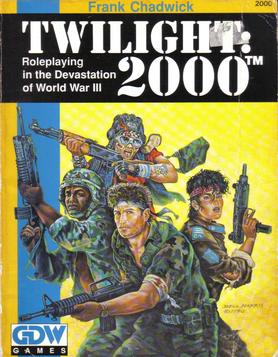
Twilight: 2000 is a 1984 post-apocalyptic military tabletop role-playing game published by Game Designers' Workshop (GDW). Set in the aftermath of World War III, the game operates on the premise that the United States/NATO and the Soviet Union/Warsaw Pact have fought a lengthy conventional war followed by a limited nuclear war with all its consequences. The player characters are survivors of said war.
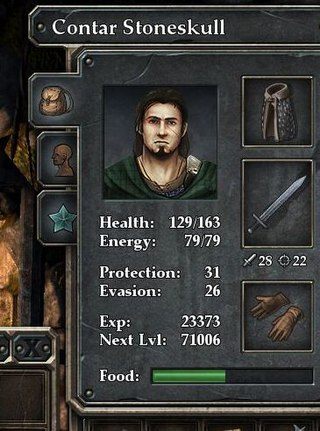
An experience point is a unit of measurement used in some tabletop role-playing games (RPGs) and role-playing video games to quantify a player character's life experience and progression through the game. Experience points are generally awarded for the completion of objectives, overcoming obstacles and opponents, and successful role-playing.

A role-playing video game, role-playing game (RPG) or computer role-playing game (CRPG) is a video game genre where the player controls the actions of a character immersed in some well-defined world, usually involving some form of character development by way of recording statistics. Many role-playing video games have origins in tabletop role-playing games and use much of the same terminology, settings, and game mechanics. Other major similarities with pen-and-paper games include developed story-telling and narrative elements, player character development, complexity, as well as replay value and immersion. The electronic medium removes the necessity for a gamemaster and increases combat resolution speed. RPGs have evolved from simple text-based console-window games into visually rich 3D experiences.
Confrontation is a skirmish level tactical fantasy miniature wargaming in which the combatants are represented by metal or plastic figures in 28 mm scale. For comparison purposes, the system's figures are slightly larger than those of Games Workshop or The Foundry.

Savage Worlds is a role-playing game written by Shane Lacy Hensley and published by Pinnacle Entertainment Group. The game emphasizes speed of play and reduced preparation over realism or detail. The game received the 2003 Origin Gamers' Choice Award for best role-playing game.

The history of role-playing games began when disparate traditions of historical reenactment, improvisational theatre, and parlour games combined with the rulesets of fantasy wargames in the 1970s to give rise to tabletop role-playing games (TTRPGs). Multiple TTRPGs were produced between the 1970s and early 1990s. In the 1990s, TTRPGs faced a decline in popularity. Indie role-playing game design communities arose on the internet in the early 2000s and introduced new ideas. In the late 2010s and early 2020s, TTRPGs experienced renewed popularity due to videoconferencing, the rise of actual play, and online marketplaces.
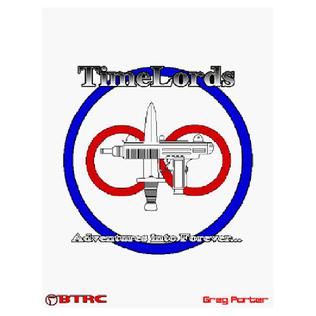
TimeLords is a set of time travel role-playing games by Greg Porter and published by Blacksburg Tactical Research Center (BTRC). The first two editions used a custom d20-based game system; the most recent edition uses the EABA system from BTRC.

Jeanne d'Arc is a tactical role-playing video game developed by Level-5 and published by Sony Computer Entertainment for the PlayStation Portable (PSP). The game was released in Japan on November 22, 2006, and was localized for a release in North America on August 21, 2007. Jeanne d'Arc was Level-5's first role-playing video game of this kind, as well as the studio's first production for the PSP. The title's narrative makes use of various fantasy elements, and is loosely based on the story of Joan of Arc and her struggles against the English occupation of France during the Hundred Years' War in the early 15th century.
Rackham was a French miniature and role-playing games production company founded in 1997 by Jean Bey, CEO and Creative Director. At its peak, Rackham had over 70 employees, including designers, illustrators, writers, sculptors, painters, and foundry-workers, and were managed by Jean Bey until November 2008. Following the transformation to Rackham Entertainment, Jean Bey retained only his Art Director position and the management of the Sentinel program.
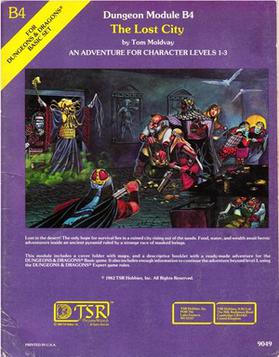
The Lost City (B4) is a Dungeons & Dragons adventure module by Tom Moldvay. It was first published by TSR in 1982 and was designed as a stand-alone adventure for use with the Dungeons & Dragons Basic Set. The working title for the module was "The Lost City of Cynidicea". Moldvay designed the module as a low-level scenario to give novice Dungeon Masters experience in fleshing out adventures such that it is only partially complete. The plot involves the player characters discovering a ruined subterranean city slowly rising out of the sands. The adventure is set inside a huge step pyramid, with the lower pyramid only sketched out and the city itself described with a list of the major areas and a map. The adventure's main villain is Zargon, a giant one-eyed monster and his minions. The entire double pyramid, not including the city, contains over 100 rooms.

Powers & Perils (P&P) is a fantasy role-playing game published by Avalon Hill in 1984. The highly complex game was Avalon Hill's first foray into the role-playing game market, and proved to be a commercial failure.

Neverwinter Nights is a series of video games developed by BioWare and Obsidian Entertainment, based on the Forgotten Realms campaign setting of the Dungeons & Dragons role-playing game. Aside from also being set around the city Neverwinter, it is unrelated to both the 1991 Neverwinter Nights online game and the 2013 online game called Neverwinter.

A tabletop role-playing game, also known as a pen-and-paper role-playing game, is a classification for a role-playing game (RPG) in which the participants describe their characters' actions through speech and sometimes movements. Participants determine the actions of their characters based on their characterization, and the actions succeed or fail according to a set formal system of rules and guidelines, usually involving randomization. Within the rules, players have the freedom to improvise, and their choices shape the direction and outcome of the game.
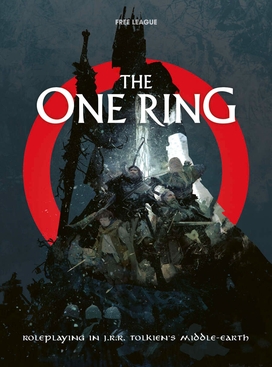
The One Ring Roleplaying Game is a tabletop role-playing game set in J. R. R. Tolkien's Middle-earth, set at the time between The Hobbit and The Lord of the Rings. Designed by Francesco Nepitello and Marco Maggi, the game was initially published by Cubicle 7 in 2011 under the title The One Ring: Adventures over the Edge of the Wild. Cubicle 7 continued to publish the first edition of the game until 2019. Nepitello and Maggi developed the second edition, which is published by Free League Publishing under the same title, The One Ring Roleplaying Game.

Paul Bonner is a fantasy artist who has produced artwork for major fantasy gaming companies and others.

Avatar Legends: The Roleplaying Game is a fantasy tabletop role-playing game produced by Magpie Games. It is set in the world of the animated television series Avatar: The Last Airbender and The Legend of Korra, and takes place in five different time periods. Players take the roles of martial artists, technological experts, or benders – people who can manipulate one of the four classical elements – who fight for balance in the world while also working towards their own goals and struggling with inner balance, represented by opposing ideals held by a character.















